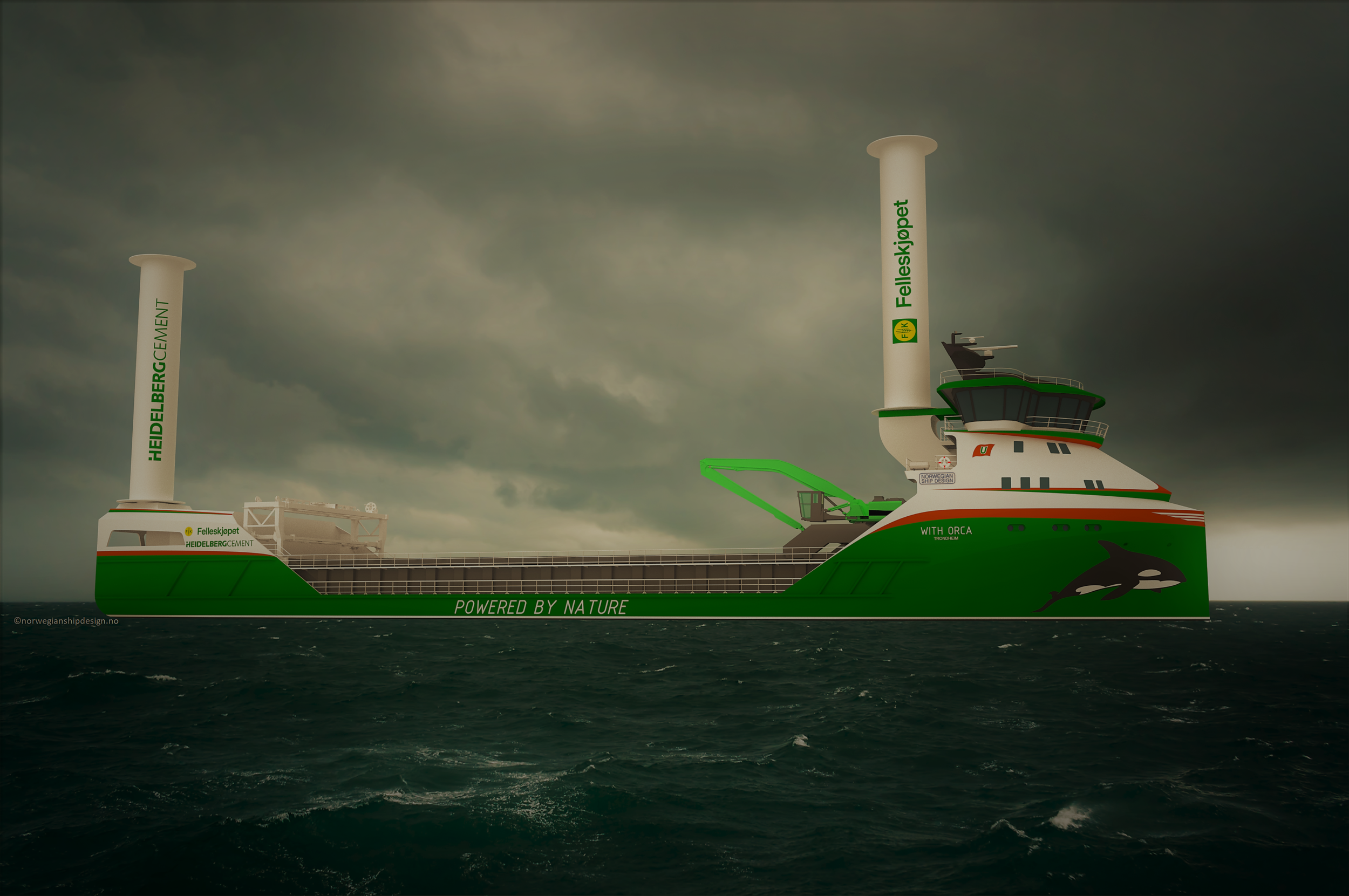“With Orca” hydrogen fuelled bulk carrier project awarded LR Approval in Principle.
Important milestone reached for groundbreaking zero-emission vessel
Lloyd’s Register (LR) has awarded Approval in Principle (AiP) to Norwegian ship owner Egil Ulvan Rederi AS for its zero-emission self-discharging hydrogen-fuelled bulk carrier, With Orca. The vessel is planned to enter into a long-term transport contract with cargo owners Felleskjøpet Agri and Heidelberg Cement.
With Orca will be fully zero-emission in all operations. It will be powered by hydrogen, stored onboard in compressed form, and the hydrogen combustion engine will be optimised for increased efficiency. The vessel will also have a fuel cell system for energy production in low load conditions. A significant part of the energy required to operate the 88 m/5,500 tonne vessel will be harvested directly from the wind through two large rotor sails. The vessel also has the ability to store excess energy in batteries.
LR awarded the AiP after completion of a risk-based HAZID certification. LR was selected as the class society for this complex project because of its experience and expertise with hydrogen-fuelled vessels and projects using novel fuels. The project marks a milestone in the journey towards a zero-emission future for the shipping industry. The vessel is designed by Norwegian Ship Design and the hydrogen will be supplied by Statkraft. It is scheduled to enter operation in early 2024.
The vessel’s sailing route will mostly be in open waters in the North Sea, where weather conditions are ideal for wind-assisted propulsion. With Orca will combine the cargoes of Heidelberg Cement and Felleskjøpet, carrying aggregates from western to eastern Norway and grain in the opposite direction.
Mark Darley, LR Marine and Offshore Director, said: “LR is delighted to have been selected for this world first project that utilises several alternative propulsion technologies. Through our thorough risk-based analysis we are happy to award approval in principle for the use of hydrogen as a sustainable and safe solution for vessel propulsion. LR is a pioneer in maritime decarbonisation and is supporting our clients to assess the technological, commercial and societal viability of multiple transition pathways.”
Ivar Ulvan, Owner and Project Manager of Egil Ulvan Rederi, said: “Receiving the AiP from Lloyd’s Register is an important milestone for us. We have been working with the project for more than 1.5 years, and the AiP confirms that we have made good design choices in our effort to create a safe, efficient and feasible concept. We have learned a lot in the process towards the AiP, and LR has been very professional. We want to highlight their facilitation of the HAZID, which was skilfully carried out to an impressive level of detail. We look forward to continue working towards realising this groundbreaking project.”
Gjermund Johannessen, Norwegian Ship Design CEO, said: “We would like to commend both LR and the Norwegian Maritime Authority for their professional and positive involvement in this project. We have been working hard evaluating different solutions for the hydrogen system onboard. We have developed a unique and safe hydrogen concept, and we used hydrogen’s special properties as one of the means to achieve this.”
Per-Kenneth Øye, Chief Transport Officer at Felleskjøpet Agri SA, said: “Our aim is to achieve sustainable fleet renewal, phasing out old tonnage. The project was initiated to set the standard for others to follow, and we are pleased that we now have accomplished this important step.”
Lars-Erik Marcussen, Project Manager Logistics, Heidelberg Cement, said: “We are pleased to have reached this milestone on the road to use hydrogen at sea. Sustainable shipping is needed in all industries, and we hope this sets a standard for swift implementation of new, green technology.”
LR is actively involved in a number of maritime decarbonisation projects though its Maritime Decarbonisation Hub, both in this region and globally, helping to accelerate the safe and sustainable decarbonisation of the maritime sector through leadership, collaboration and evidence-based decision-making.

